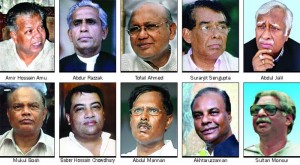 The ruling Awami League have dropped heavyweights dominating the party for decades from the central executive committee presumably for their controversial role during the early 2007 political changeover as it announced the key committee positions on Thursday, five days after its triennial council session.
The ruling Awami League have dropped heavyweights dominating the party for decades from the central executive committee presumably for their controversial role during the early 2007 political changeover as it announced the key committee positions on Thursday, five days after its triennial council session.
A number of young politicians have been named to top party ranks in consultation with the party’s grassroots leadership.
Syed Ashraful Islam, who was elected the party’s general secretary at the Awami League council session on July 24, announced the new presidium, secretaries and the advisory council at a briefing at Jamuna, the official residence of the prime minister, Sheikh Hasina.
Senior leaders Amir Hossain Amu, Abdur Razzak, Tofail Ahmed and Suranjit Sengupta, who were not given any portfolio in the AL cabinet formed on January 6, have been named on the 20-member advisory council. They were all presidium members.
The immediate-past general secretary Abdul Jalil, who stepped down from the position on July 21, has also been made an advisory council member.
The Awami League at the briefing distributed the list of new party executives, signed by Sheikh Hasina who was elected the party president for the sixth term during the council session.
The councillors invested Hasina with the power to fill in 45 party posts of the 73-member executive committee for the next three years in the party’s council session when the president and the general secretary were elected.
Two of the 45 positions, including a joint general secretary and the information and research secretary, will be announced soon, said Ashraful, also a key minister in Hasina’s cabinet.
The 26 executive members were not named on Thursday. The party president will select the members in consultation with the presidium and the names will be announced soon, Ashraful said.
Yusuf Hossain Humayun, Rajiuddin Ahmed Raju, Abdul Latif Siddiqui, Satish Chandra Roy, Sahara Khatun and Obaidul Kader have been included in the presidium, the party’s highest policy-making body.
The party leaders who came to be known as reformists during the two-year military-controlled interim regime, which had apparently pursed political reforms and a ‘minus two formula,’ were dropped from key positions.
Joint general secretary Mukul Bose, organising secretaries Saber Hossain Chowdhury, Abdul Mannan, Aktaruzzaman, Mahmudur Rahman Manna and Sultan Mohammad Monsur Ahmed, health secretary Mostafa Jalal Mohiuddin and relief and social welfare secretary Nazma Rahman were dropped.
Organising secretaries Abdur Rahman and Bir Bahadur were also dropped from the committee.
The new advisory council is now composed of Dr SA Malek, Abul Maal Abdul Muhith, HT Imam, Amir Hossain Amu, Abdur Razzak, Tofail Ahmed, Suranjit Sengupta, Abdul Jalil, retired major general KM Shafiullah, Dewan Farid Gazi, Rahmat Ali, Abdul Khaleque, AK Azad Chowdhury, MA Mannan, Professor Abdul Mannan, Kazi Akram Uddin, SM Nurunnabi, Syed Rezaur Rahman, Alauddin Ahmed and Mashiur Rahman.
The presidium members are Sayeda Johra Tajuddin, Syeda Sajeda Chowdhury, Ataur Rahman Khan Kaiser, Yusuf Hossain Humayun, Begum Matia Chowdhury, Sheikh Fazlul Karim Selim, Dr Mohiuddin Khan Alamgir, Kazi Zafarullah, Rajiuddin Ahmed Raju, Abdul Latif Siddiqui, Satish Chandra Roy, Sahara Khatun and Obaidul Kader.
Mahabub-ul-Alam Hanif and Dr Dipu Moni have been made joint general secretaries while Jahangir Kabir Nanak, Ahmed Hossain, Mesbah Uddin Seraj, BM Mojammel Huq, AFM Bahauddin Nasim, Abu Sayeed Swapan and Khalid Mahamud Chowdhury have been made organising secretaries.
AFM Mostofa Kamal (Lotus) has been made finance and planning secretary, Syed Abul Hossen international affairs secretary, Abdul Matin Khasru law secretary, Abdur Razzak agriculture secretary, Faridunnahar Laily relief and social welfare secretary, Advocate Abdul Mannan Khan office secretary, Sheikh Mohammad Abdullah religious affairs secretary, Nuh-ul-Alam Lenin publicity secretary, Dr Hasan Mahmud environment affairs secretary, Yafes Osman science and technology secretary, Fazilatunessa Indra women affairs secretary, Tajul Islam liberation war affair secretary, Dewan Shafiul Arefin Tutul youth and sports secretary, Nurul Islam Nahid education secretary, Faruk Khan commerce and industries secretary, Habibur Rahman Siraj labour and manpower secretary, Asaduzzaman Noor cultural affairs secretary, Badiuzzaman Bhuiyan health and population secretary, HN Ashiqur Rahman treasurer, Mrinal Kanti Das deputy office secretary and Asim Kumar Ukil deputy publicity secretary.
Ashraful at the briefing said he along with the party president had worked out the committee as the party councillor invested the party president with the responsibility in this regard.
He said the party president had considered the opinions of the grassroots leaders who had visited the party president for five days in connection with the formation of the committee.
In reply to a question, Ashraful said evaluation of the recommendations of grassroots leaders was also a democratic process. ‘The democracy that the media and civil society actors project is not the real democracy,’ he said. ‘I had worked for the Labour Party in the United Kingdom for long and I know how their leaders are elected.’




















